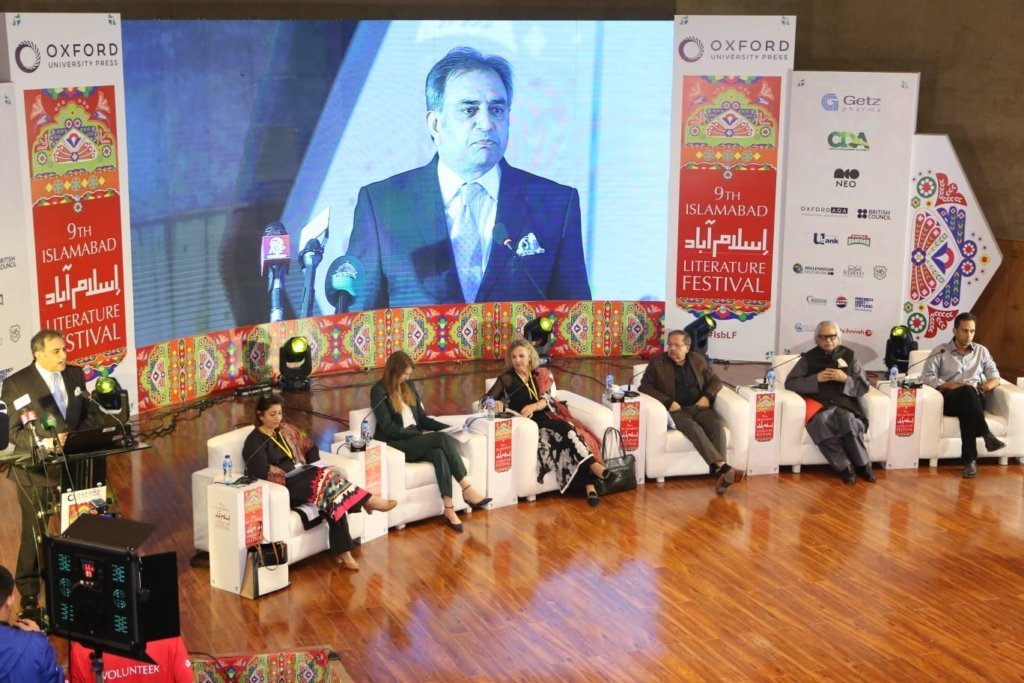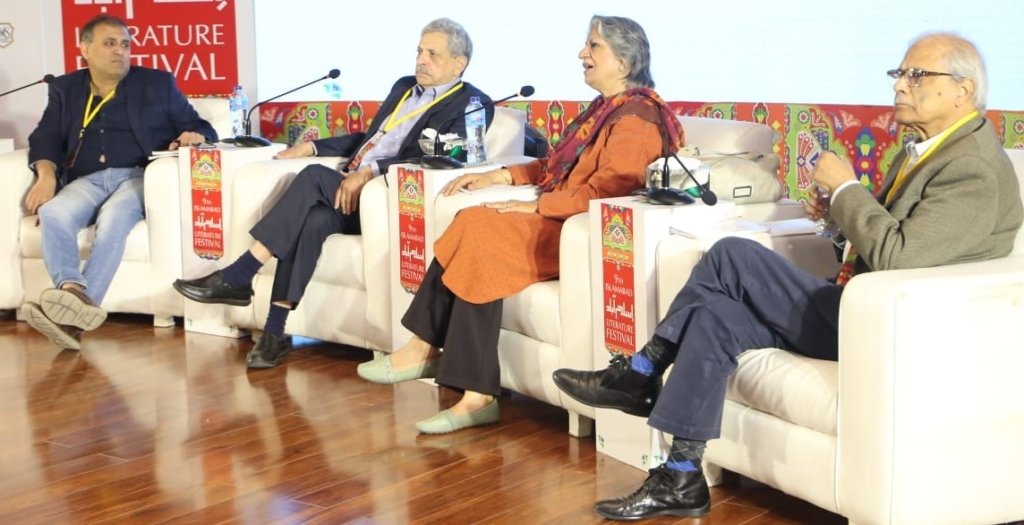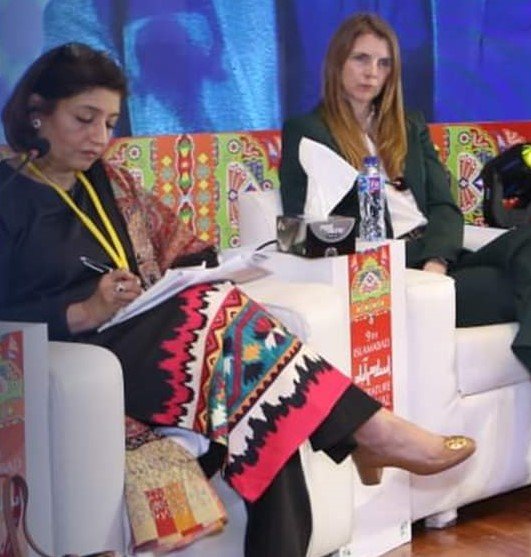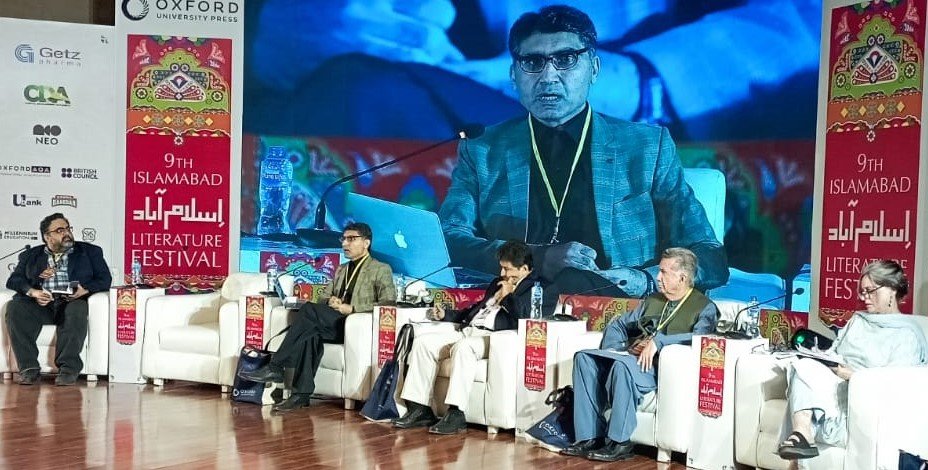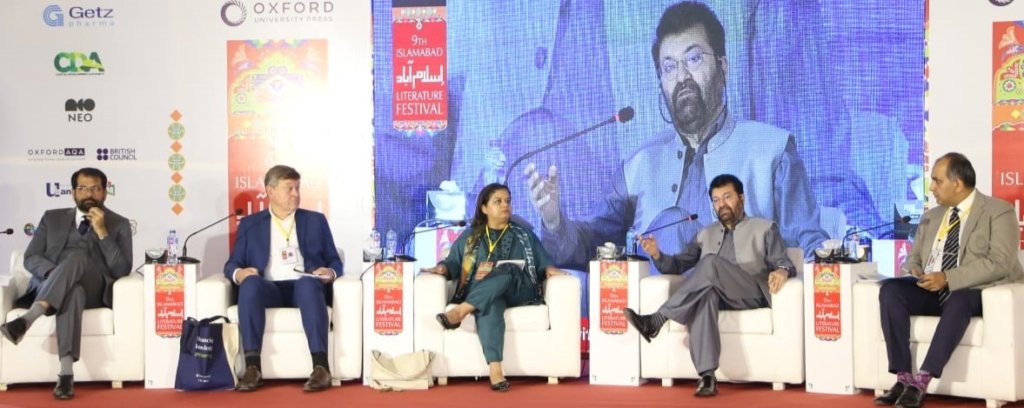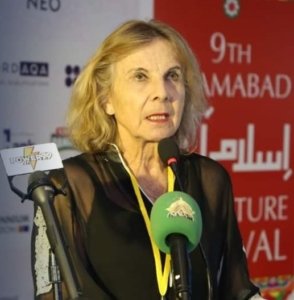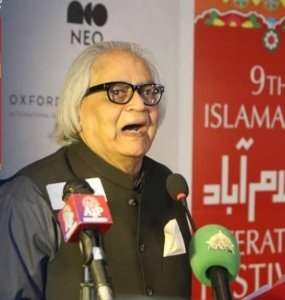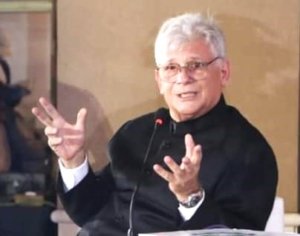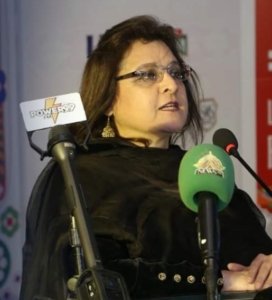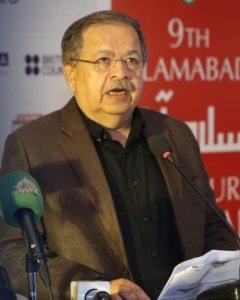The 9th edition of the ILF returns to the capital city with fresh ideas, and alternative perspectives.
News Desk
Islamabad, Nov 4: Panelists continued to generate debate, inspire, and enlighten attendees on the second day of the ninth Islamabad Literature Festival in the Gandhara Citizen Club, Fatima Jinnah Park on Saturday.
Organized by Oxford University Press (OUP) with a focus on sustainability, diversity, and the potential of human imagination, the literary extravaganza is a celebration of fresh ideas, alternative perspectives, and the art of storytelling.
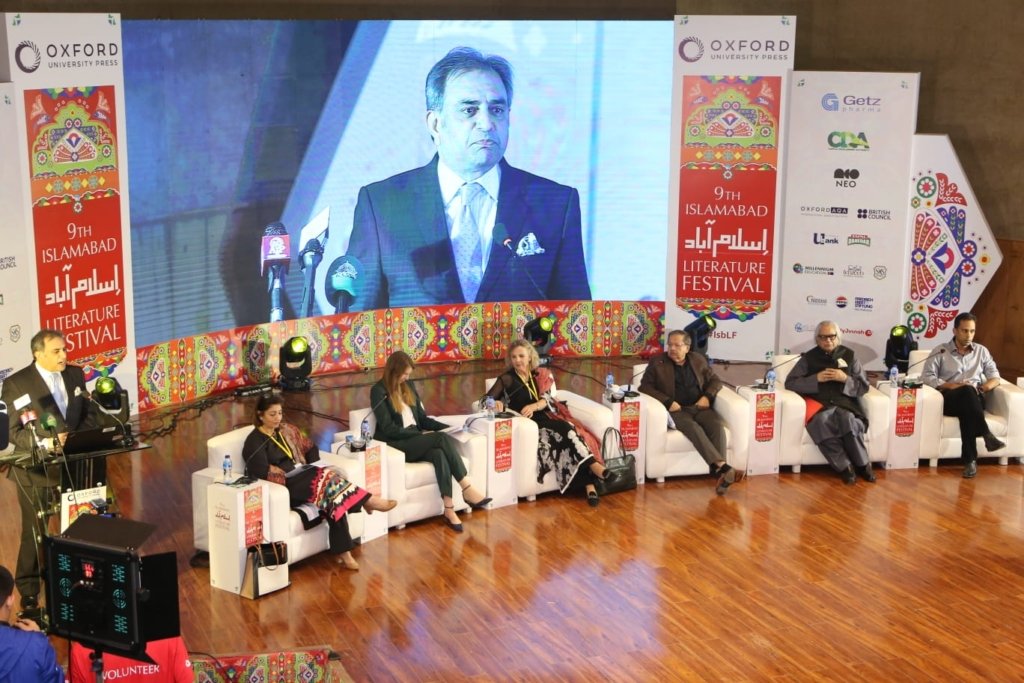
The exciting event offered a captivating exploration of literature in all its forms, featuring renowned authors and experts engaged in discussions and delivering keynote speeches.
Themed “People, Planet, Possibilities” this year, the event serves as a call to action, encouraging individuals, communities, and organizations to collaborate in the pursuit of a more sustainable and inclusive world. It envisions a multitude of possibilities that can be achieved through collective efforts guided by purpose and vision.
The three-day event features panel discussions on literature, democracy, governance, history, education, economy, technology, development, conflict, media, and art including ‘Pakistan’s Wars: an alternative history’; ‘Destined to fail democracy and state building experiment in post-Taliban Afghanistan’.
Moderated by Yaqoob Bangash, the session saw Professor Emeritus Tariq Rahman present the main findings of his work tracing the history of wars in Pakistan, followed by a discussion on the economic implications of such events.
Moeed Yusuf, while commenting on the cost of wars which is not just fiscal said, “No one who has been born after 1995 has seen a peaceful day in their lives. These people are our future, and they will be weighed down by this trauma tomorrow when they come forward.”
Engaging conversations were held around some thought-provoking and extremely diverse themes including The Dark Side of Journalism-Culture and Political Economy of Global Media in Pakistan and Afghanistan, moderated by Fasi Zaka highlighted the role of stringers and fixers in the last few decades in KP region.
Academic and author Syed Irfan Ashraf spoke about the challenges faced by Pashtun journalists while former senator and intellectual Afrasiab Khattak shed light on the importance of the KP region as a periphery within a periphery. Hamid Mir also acknowledged the various issues and lamented the coverage of many events in the post-9/11 era where the fixers risked their lives for foreign media outlets.
Moderated by Mina Malik, ‘Ink and Empowerment: Women in Publishing’, raised various issues about the journey of women publishers. Both Muneeza Shamsie and Mehvish Amin narrated their experiences about getting published, and distribution as well as the role of libraries in promoting local writers.
Different panels with diverse speakers came together to discuss the power of literature in representing and celebrating a wide range of voices and perspectives.
Moderated by Khayyam Mushir, the discussion titled Democracy, Bureaucracy, and Judiciary delved into different aspects especially tenets of good governance which are missing in the bureaucracy today. Senior lawyer Hamid Khan, Fauzia M. Sana, and senior journalist Zahid Hussain shared their perspectives about measures that can address these issues by referring to the sociopolitical scenario in the country.
Moderating the session, ‘AI in Education’, Saquib Ahmad, Managing Director SAP Pakistan, said that earlier the entire focus used to be on getting the right answers but in today’s fast-paced world, it is all about asking the right questions to extract the correct answers. Shahid Mahmud shared that while there is reluctance towards AI, it has been around since the late 1950s; it’s only the pace that has now picked up immensely.
In the session Fair Assessments: Ensuring Equity and Excellence in Education, Andrew Coombe, Managing Director OxfordAQA, reinforced the importance of fair assessments and said that the aim of the system is to make a high-quality syllabus that is valid, reliable, and comparable.
The speakers agreed that assessments should be stepping stones, not stumbling blocks, in the journey towards educational excellence. Equity in education means assessments that accommodate and celebrate the diverse strengths and experiences of every student.
The humourous session of Khaled Anam and Beo Zafar titled ‘Hans Kar Jiyo’ was a sight to behold. The duo delighted the audience with Anam’s signature wit and Zafar’s masterful mimicry.
The day came to an end with the screening of the feature film “Kamli,” which was introduced by Sarmad Khoosat. Simultaneously, a captivating Mushaira took place, featuring a gathering of renowned poets who mesmerized the audience with their poetic verses. Iftikhar Arif presided over the Mushaira, with Mehboob Zafar as the host. This dynamic collaboration transported the score of the audience to a realm of literary sophistication and artistic beauty, underscoring the festival’s dedication to honouring various storytelling forms and cultural legacies.
Other interesting themes included Mahmil o Jaras: Collection of Unpublished Poems by Josh Malihabadi; Pakistani Prose and Verse Exploring Contemporary English Literature; Qaidi by Omar Shahid Hamid translated from English by Inaam Nadeem; Grieving for Pigeons Twelve Stories of Lahore by Zubair Ahmad; Shaping the Future of Learning; Ink and Empowerment: Women in Publishing; Lahore’s Lost Legacy Unveiling the Life and Contributions of Sir Ganga Ram; The Other In The Mirror: Stories from India and Pakistan edited by Sehyr Mirza; Hans Kar Jeeyo; The Lost Heritage and Dandelion Blooms: The Evolution of Islamabad.
Opening session
Earlier the inauguration of the literature extravaganza was held on Friday.
British High Commissioner Jane Marriott while speaking in the opening session expressed gratitude for the recognition that Pakistani authors, especially those writing in the English language, had attained at a global level.
She stated, “To allow yourself to be lost and unleash your imagination makes you realize how powerful all forms of literature are. Words offer us a world of self-expression and creativity and are a gateway to a greater understanding of our experiences.”
She also referred to the relationship between the UK and Pakistan, particularly the profound connections in education and culture.
Iftikhar Arif, a prominent Urdu poet, scholar, and literary figure from Pakistan, spoke at length about the various languages, both spoken and written, and felt that those need recognition at the state level as well.
Mr Arif also provided the opportunity to express his deep and profound sympathies regarding the ongoing armed conflict in the Gaza Strip and articulated how imperative peace was in the region
Victoria Schofield, a British author, biographer, and historian, expressed her delight at being back in Pakistan and her eagerness to explore the 9th edition of ILF.
Khalid Mahmood, Managing Director of Getz Pharma reiterated the significance of sustainability and inclusivity, stating that a sustainable world invites everyone to share in its abundance, regardless of their background or circumstances.
“Inclusivity is the cornerstone upon which the pillars of sustainability rest, as it ensures that no one is left behind on the journey toward a greener and more equitable planet. True sustainability lies in sustaining opportunities, resources, and justice for all, irrespective of their identities or origins.”
Nauman Khalid representing Capital Development Authority (CDA), said he was impressed by the festival and stressed holding many such events in the future. The ceremony was concluded by Zahshanne Malik, a renowned actor, performer, artist, and dancer, who captivated the audience with her moving interpretation of Faiz Ahmed Faiz’s ‘Lao to Qatal Nama Mera.’
The session was followed by an insightful session on Iqbal: Aik Ehed Saaz Shair delved into how Iqbal’s poetry shaped the times, moderated by Nasira Zuberi, with Ahmed Atta reciting the selected poetry for the audience.
In a parallel session, Tariq Alexander Qaiser and Umber Khairi engaged in a thought-provoking conversation on Pakistan’s Mangroves: A Forest in Peril.
The day ended with a meaningful discussion on the right to religious freedom, where Syed Irfan Ashraf conversed with Yaqoob Bangash, Farzana Bari, Pritam Das Rathi, and Maham Ali to explore “Jinnah’s Vision: Safeguarding Religious Freedom.”
Two remarkable art exhibitions have been curated especially for the weekend-long occasion by connoisseurs Quddus Mirza, Ammar Faiz, and Fauzia Minallah. The beautiful frames and sculptures will be showcased on all festival days and present an excellent opportunity to appreciate the value of expression, whether through print or brush strokes and reflect on the power of communication.
OUP managing director Arshad Saeed Husain in his opening remarks, welcomed the distinguished panelists, and attendees.
He underscored the significant impact of literary festivals, stressing that fostering a cultural shift depends on the celebration of diverse perspectives and their constructive effects.
“Literature stands as a testament to human resilience and provides a beacon of light in the darkest of times. Let us collectively look beyond uncertainty and embrace the beauty that tomorrow holds,” he concluded.
About OUP
Oxford University Press (OUP), a branch of the University of Oxford, is dedicated to global publishing for various audiences. It produces dictionaries, educational materials, children’s books, journals, and more. With roots dating back to 1478, OUP received printing rights in 1586, extended to cover all book types in 1636.
Presently, OUP operates in over 50 countries, publishing in more than 90 languages, making it the largest university press globally.
About OUP Pakistan
Established in 1952, OUP Pakistan focuses on education, publishing school textbooks, higher education materials, academic works, and reference materials on a wide range of subjects, including law, economics, literature, and more. It also supports Pakistani authors and books about Pakistan. The press advocates for cultivating a culture of book-reading in Pakistan and fights against piracy.

The High Asia Herald is a member of High Asia Media Group — a window to High Asia and Central Asia

